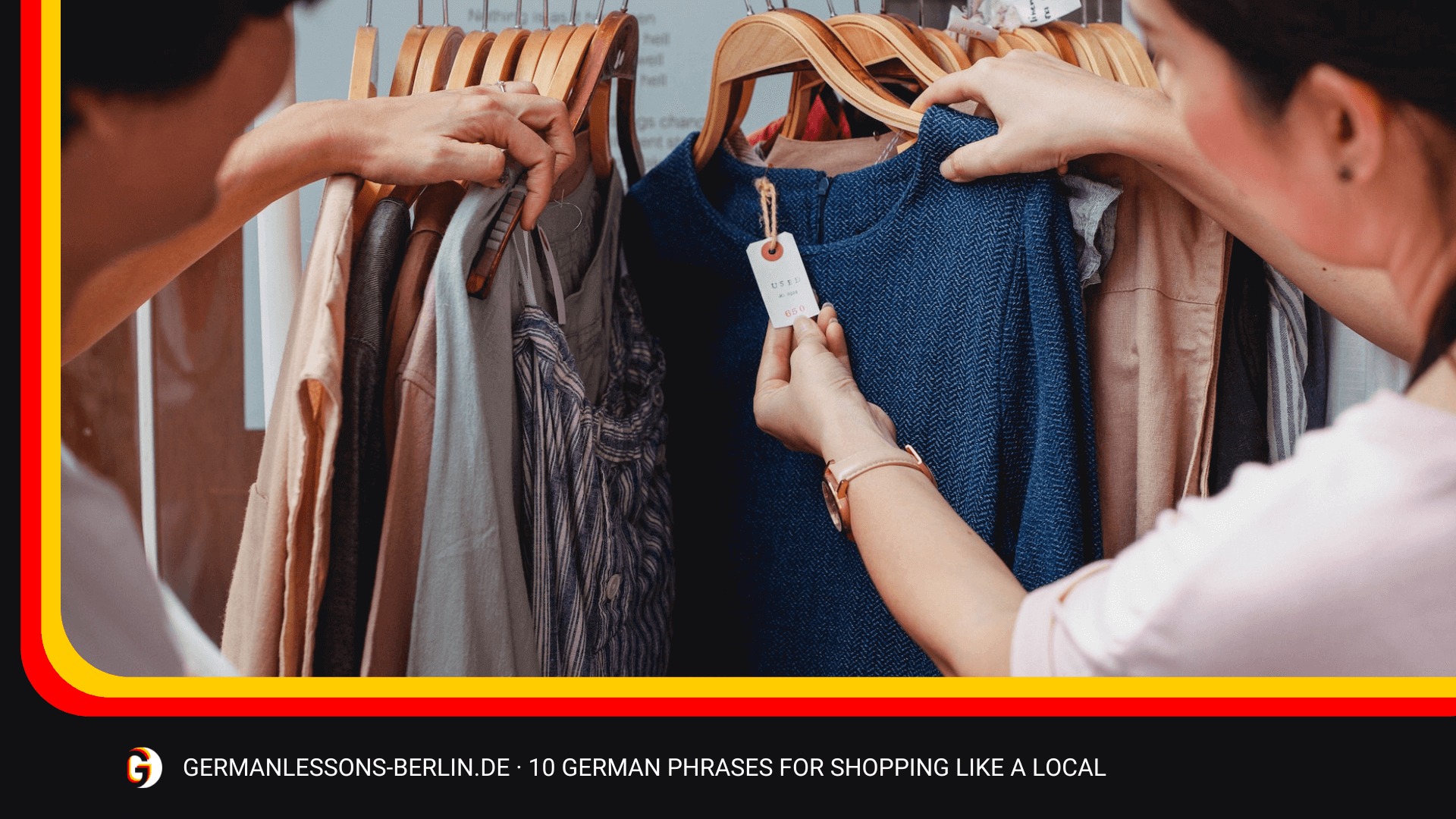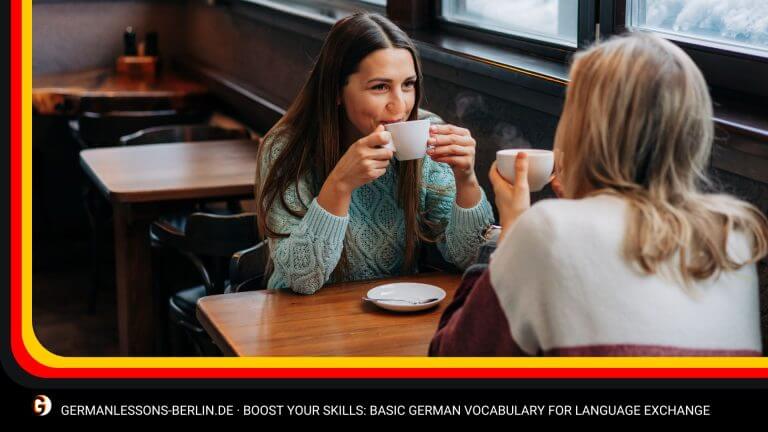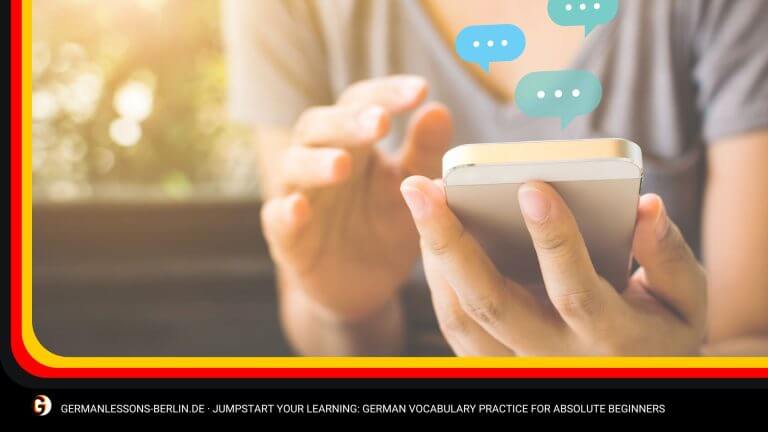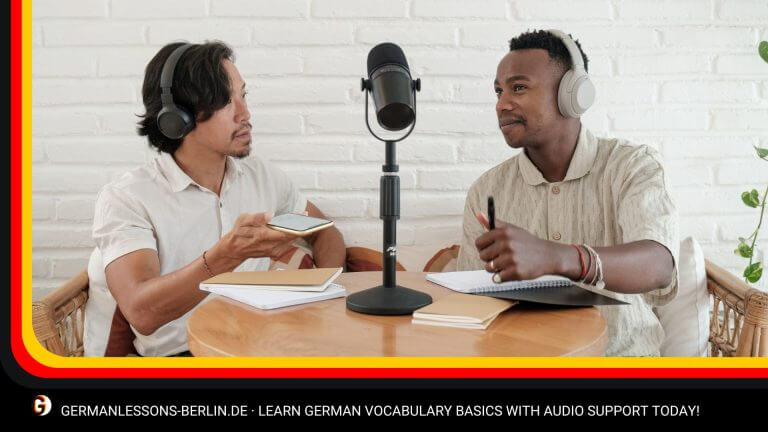Shopping in Germany can be an incredibly rewarding experience. Whether you’re just browsing, looking for souvenirs, or stocking up on groceries, it pays to know the local language so that you can shop like a pro! If you’re planning a trip to Germany and want to get some shopping done while there, here are 10 essential German phrases for making your purchase with ease.
This guide will provide easy-to-learn tips on how to speak German during your shopping excursion. You’ll learn basic terms such as ‘how much does this cost?’ and ‘can I have a discount?’, as well as more complex expressions like ‘I’d like to return this.’ Armed with these 10 key words and phrases, you’ll be able to confidently navigate any store in the country – no matter what type of product or service you need.
Ready to start speaking German? Let’s dive right in! With these handy tools at your disposal, you’ll be shopping like a native in no time!
Table of Contents
Greetings
Germans are known to be very friendly and polite, which is why it’s important to know the right greetings when shopping in Germany. According to a survey conducted by German news magazine Der Spiegel, 81% of Germans prefer the more formal greeting ‘Guten Tag’ instead of the casual ‘Hallo. That said, some people may opt for the less formal ‘Gruss’, while others might use ‘Servus’ or even ‘Tschüss’ as their go-to phrase. It all depends on where you’re from and what kind of atmosphere you’re trying to create. No matter which one you choose though, it’s always important to remember that politeness goes a long way in any situation. With this in mind, let’s move on to learning about asking for help with your purchases.
Greet Like a Local: 10 German Phrases for Saying Hello
- “Guten Morgen!” – This means “Good morning!” and is used as a greeting when you meet someone in the morning.
- “Guten Tag!” – This means “Good day!” and is a general greeting that can be used at any time of day.
- “Guten Abend!” – This means “Good evening!” and is used as a greeting when you meet someone in the evening.
- “Hallo!” – This is a more informal greeting that simply means “Hello!” and can be used at any time of day.
- “Wie geht es Ihnen?” – This means “How are you?” and is a polite way to greet someone and ask how they are doing.
- “Wie geht’s?” – This is a more casual way to ask “How are you?” and is often used among friends and acquaintances.
- “Schön Sie kennenzulernen!” – This means “Nice to meet you!” and is used when you are meeting someone for the first time.
- “Tschüss!” – This is a casual way to say “Goodbye!” and is commonly used among friends and acquaintances.
- “Auf Wiedersehen!” – This means “Goodbye!” and is a more formal way to say farewell.
- “Bis bald!” – This means “See you soon!” and can be used as a friendly way to say goodbye and indicate that you hope to see the person again soon.
Asking For Help
Now that you know the basics of saying hello and goodbye in German, let’s move onto asking for help. When shopping like a local, it is often necessary to seek assistance from store employees or other locals when trying to find specific items or get helpful advice. Here are several phrases to keep in mind when inquiring assistance:
- “Können Sie mir helfen?” (Can you help me?)
- “Ist jemand hier, der Englisch spricht?” (Is there anyone here who speaks English?)
- Wo kann ich…finden?” (Where can I find…) In addition to asking shopkeepers and other locals for assistance, you may also want to use online resources such as Google Translate or language-learning websites to further your understanding of the German language. This could be especially beneficial if you plan on staying in Germany for an extended period of time. With these tools at your disposal as well as some basic conversational skills, you should have no trouble getting the information needed while shopping like a local. Now that we’ve covered how to ask questions and receive help, let’s take a look at comparing prices.
10 Essential German Phrases for Asking for Help While Shopping
- “Könnten Sie mir bitte helfen?” – This means “Could you please help me?” It’s a polite way to ask someone for assistance.
- “Entschuldigung, könnten Sie mir bitte sagen, wo sich _ befindet?” – This means “Excuse me, could you please tell me where _ is located?” Use this phrase when you need directions or are looking for a specific place.
- “Ich verstehe das nicht. Könnten Sie es bitte erklären?” – This means “I don’t understand. Could you please explain it?” Use this phrase when you don’t understand something and need clarification.
- “Können Sie mir bitte eine Hand geben?” – This means “Can you please give me a hand?” Use this phrase when you need someone to help you with a task or to carry something heavy.
- “Hilfe! Können Sie mir bitte helfen?” – This means “Help! Can you please help me?” Use this phrase in an emergency or if you need immediate assistance.
- “Ich brauche Ihre Hilfe.” – This means “I need your help.” Use this phrase when you need someone’s assistance with a task or problem.
- “Können Sie mir bitte einen Gefallen tun?” – This means “Can you please do me a favor?” Use this phrase when you need someone to do something for you.
- “Ich habe ein Problem. Können Sie mir bitte helfen?” – This means “I have a problem. Can you please help me?” Use this phrase when you’re facing a difficulty and need assistance.
- “Können Sie mir bitte einen Rat geben?” – This means “Can you please give me some advice?” Use this phrase when you’re seeking guidance or input on a particular matter.
- “Ich bin verloren. Können Sie mir bitte helfen?” – This means “I’m lost. Can you please help me?” Use this phrase when you’re lost and need directions or assistance finding your way.
Comparing Prices
Weaving through the crowded streets of a German market, shoppers can easily feel overwhelmed when searching for the best deal. With so many vendors vying for attention, price comparison becomes key to finding the perfect item at an affordable cost. To ensure they are getting a good bargain, savvy shoppers employ several strategies such as price shopping, comparing prices and checking prices.
The first strategy is to compare prices between vendors; this involves looking at different stalls or shops with similar items on sale and then determining which has the lowest price tag attached. For example, if one shop is selling apples for €3 per kilo while another vendor is selling them for €2.50 per kilo, it’s easy to see where the better value lies. It’s important to remember that even though something may appear cheaper initially, other factors like quality need to be taken into account before making any purchase decisions.
Another technique used by locals is price shopping: rather than analyzing only two options side-by-side, customers look more broadly across multiple locations in order to find what works best for their budget. This requires patience and perseverance but ultimately leads to greater savings in the long run. In addition, taking advantage of sales or discounts can help make goods even more economical without having to sacrifice quality or quantity.
With these strategies in mind, shoppers should always be aware of what they’re spending – both time and money – when out hunting for bargains in Germany’s markets and stores. Moving forward confidently with knowledge of pricing tactics will allow consumers to feel secure when paying for an item
Shop Smarter with These 10 German Phrases for Comparing Prices
- “Wie viel kostet das?” – This means “How much does that cost?” Use this phrase to ask about the price of a specific item.
- “Ist das der beste Preis?” – This means “Is that the best price?” Use this phrase to inquire whether there are any discounts or promotions available for the item.
- “Gibt es einen Rabatt?” – This means “Is there a discount?” Use this phrase to ask if there are any current discounts available for the item you want to purchase.
- “Wie viel kostet das im Vergleich zu ?” – This means “How much does that cost compared to ?” Use this phrase when you want to compare the price of an item to a similar product.
- “Haben Sie das gleiche Produkt zu einem niedrigeren Preis?” – This means “Do you have the same product at a lower price?” Use this phrase to ask if the store has a less expensive version of the item you want.
- “Können Sie den Preis senken?” – This means “Can you lower the price?” Use this phrase if you want to negotiate the price with the shopkeeper or employee.
- “Gibt es irgendwelche Sonderangebote?” – This means “Are there any special offers?” Use this phrase to ask about any current sales or discounts that the store is offering.
- “Wo finde ich das billigste Angebot?” – This means “Where can I find the cheapest deal?” Use this phrase to ask for recommendations on where to find the best price for a particular item.
- “Gibt es eine Preisgarantie?” – This means “Is there a price guarantee?” Use this phrase to ask if the store offers a price match or price guarantee policy, where they will match or beat the price of a competitor’s product.
- “Können Sie mir helfen, einen besseren Preis zu finden?” – This means “Can you help me find a better price?” Use this phrase to ask for assistance from the shopkeeper or employee in finding the best price for the item you want to purchase.
Paying For An Item
Paying for an item in Germany is typically done with cash, but many stores accept credit and debit cards. Some shops even accept mobile payment methods such as Apple Pay and Google Pay. If you want to pay with cash, make sure the amount you want to hand over is exactly the same as what is on your bill. There are no tips in Germany; service fees are charged in advance. To pay for an item, you can head for the cashier or look for the scanner and scan it yourself. Otherwise, give the cashier your order and pay by card or cash. With this knowledge of payment methods in mind, try on clothes now!
Paying for Your Purchase: 10 Must-Know German Phrases for Shopping
- “Wie viel kostet das?” – This means “How much does that cost?” Use this phrase to ask about the price of a specific item.
- “Ich möchte das gerne kaufen.” – This means “I would like to buy that.” Use this phrase to indicate that you’re interested in purchasing the item.
- “Können Sie mir bitte die Rechnung geben?” – This means “Can you please give me the bill?” Use this phrase when you’re ready to pay for your purchase.
- “Wie möchten Sie bezahlen?” – This means “How would you like to pay?” Use this phrase when the shopkeeper or employee is ready to process your payment and wants to know your preferred method of payment.
- “Kann ich mit Karte bezahlen?” – This means “Can I pay with a card?” Use this phrase to ask if the store accepts credit or debit cards as a form of payment.
- “Können Sie das bitte einpacken?” – This means “Can you please wrap that up?” Use this phrase if you want the shopkeeper or employee to wrap up your purchase.
- “Können Sie mir bitte eine Quittung geben?” – This means “Can you please give me a receipt?” Use this phrase if you want a record of your purchase.
- “Ich zahle bar.” – This means “I’ll pay in cash.” Use this phrase to indicate that you’ll be paying with cash.
- “Ich zahle mit Karte.” – This means “I’ll pay with a card.” Use this phrase to indicate that you’ll be paying with a credit or debit card.
- “Vielen Dank für Ihre Hilfe!” – This means “Thank you very much for your help!” Use this phrase to express your gratitude to the shopkeeper or employee for their assistance during the payment process.
Trying On Clothes
Trying on clothes is like a dance. You have to know the steps and get in rhythm with your wardrobe. To try on clothing as a local, you should be aware of the following 3 elements: fitting rooms, clothing sizes, and finding the right size.
| Element | Description | Tips |
|---|---|---|
| Fitting Room | A private area for customers to try-on outfits | Ask an attendant for help if needed |
| Clothing Sizes | Measurements of clothes used to determine fit | Use measurements provided in product descriptions |
| Find Right Size | Finding garment that fits comfortably and stylishly | Try different sizes before deciding what’s best |
When trying on clothing like a local, it’s important to remember these three elements. First, understand where the fitting room is located and how it works; ask any attendant if necessary! Next, familiarize yourself with the sizing guidelines so you can pick out garments that will fit correctly. Finally, take time to find the right size by selecting several sizes or styles until you find something that looks great. With this knowledge and practice, shopping for clothes like a local becomes much easier!
10 German Phrases for Trying On Clothes and Finding Your Perfect Fit
- “Wo sind die Umkleidekabinen?” – This means “Where are the changing rooms?” Use this phrase to ask where you can find the changing rooms in the store.
- “Kann ich diese in einer anderen Größe haben?” – This means “Can I have this in a different size?” Use this phrase if you want to try on an item but the size you’ve picked out doesn’t fit quite right.
- “Haben Sie dieses Kleidungsstück in einer anderen Farbe?” – This means “Do you have this item of clothing in a different color?” Use this phrase if you like an item but want to see if it’s available in a different color.
- “Kann ich diese Hose/Bluse/ Jacke bitte anprobieren?” – This means “Can I please try on these pants/blouse/jacket?” Use this phrase when you want to ask a shopkeeper or employee if you can try on a specific item of clothing.
- “Wie finde ich diese Größe?” – This means “How do I find this size?” Use this phrase if you’re having trouble locating an item in your size.
- “Wie sieht dieses Kleidungsstück von hinten aus?” – This means “What does this item of clothing look like from the back?” Use this phrase if you want to see the back of an item of clothing.
- “Wie passt dieses Kleidungsstück?” – This means “How does this item of clothing fit?” Use this phrase to ask for feedback on how an item of clothing looks on you.
- Ich brauche eine andere Größe.” – This means “I need a different size.” Use this phrase to let the shopkeeper or employee know that the size you’re trying on doesn’t fit properly.
- “Wie lange kann ich das Kleidungsstück anbehalten?” – This means “How long can I keep the item of clothing on?” Use this phrase to ask how long you’re allowed to keep an item of clothing on while you’re trying it on.
- “Das passt perfekt!” – This means “That fits perfectly!” Use this phrase to express your satisfaction with how an item of clothing fits and looks on you.
Making A Complaint
In Germany, it’s common to lodge a complaint when dissatisfied with service or product. To raise a complaint at a store, customers should approach the staff member behind the register and politely explain their dissatisfaction. Making sure that one speaks calmly yet firmly is essential for registering their concern in an effective manner. If needed, German-speaking shoppers can ask for assistance from other staff members who may be able to help them communicate more effectively. It’s important to remain courteous and reasonable throughout this process so as not to become confrontational. With all of these steps taken into consideration, making a complaint while shopping like a local becomes much easier.
Next, returning an item requires different considerations…
Speak Up: 10 German Phrases for Making a Complaint While Shopping
- “Entschuldigung, ich habe eine Beschwerde.” – This means “Excuse me, I have a complaint.” Use this phrase to start your conversation with the shopkeeper or employee.
- “Ich bin mit diesem Produkt nicht zufrieden.” – This means “I’m not satisfied with this product.” Use this phrase to express your dissatisfaction with a specific item.
- “Dieses Produkt funktioniert nicht richtig.” – This means “This product isn’t working properly.” Use this phrase if you’ve purchased an item that isn’t working correctly.
- “Können Sie mir bitte helfen?” – This means “Can you please help me?” Use this phrase to ask the shopkeeper or employee for assistance in resolving your complaint.
- “Können Sie dieses Problem bitte lösen?” – This means “Can you please solve this problem?” Use this phrase to request that the shopkeeper or employee help you resolve the issue.
- “Ich möchte gerne mein Geld zurück.” – This means “I would like to have my money back.” Use this phrase if you want a refund for a product that you’ve purchased.
- “Können Sie mir bitte eine Erklärung geben?” – This means “Can you please give me an explanation?” Use this phrase if you want to understand why a product or service didn’t meet your expectations.
- “Ich habe eine Beschwerde über den Service.” – This means “I have a complaint about the service.” Use this phrase if you’ve experienced poor customer service.
- “Ich erwarte eine angemessene Lösung.” – This means “I expect a reasonable solution.” Use this phrase to convey that you’re looking for a fair and reasonable resolution to your complaint.
- “Können Sie mir bitte den Namen und die Telefonnummer des Managers geben?” – This means “Can you please give me the name and phone number of the manager?” Use this phrase if you want to escalate your complaint to a higher authority.
Returning An Item
Now that you’ve made your complaint and the store employees have promised to improve their service, it’s time to look at how returning an item works in Germany. After all, there are times when it would be better not to keep what you bought – especially if it was a mistake! Fortunately, most stores in Germany have reasonable return policies that will help ensure customers get the satisfaction they deserve.
For starters, many stores in Germany allow customers to return items within 14 days of purchase with no questions asked (though some may require proof of purchase). This makes it easy for shoppers to exchange an item or get a refund without any hassle. Additionally, many German retailers offer extended returns during certain holiday seasons so people can shop with confidence knowing they won’t be stuck with something they don’t want.
In terms of actually bringing back an item to the store, most places accept returned goods either by post or in person at their physical locations. It’s important to note though that depending on where you’re shopping from and what type of product it is (clothing vs electronics for example), the return process might vary slightly. That said, as long as you follow the instructions provided by the retailer, you should have no trouble getting your money back quickly and easily.
So now that we know how returning an item works in Germany, let’s take a look at packing and shipping items…
Hassle-Free Returns: 10 German Phrases for Returning Your Items
- “Entschuldigung, ich möchte gerne dieses Produkt zurückgeben.” – This means “Excuse me, I would like to return this product.” Use this phrase to initiate the return process with the shopkeeper or employee.
- “Es gibt ein Problem mit diesem Produkt.” – This means “There is a problem with this product.” Use this phrase to explain why you are returning the item.
- “Das Produkt ist beschädigt.” – This means “The product is damaged.” Use this phrase if the item is defective or has been damaged in some way.
- “Ich habe das falsche Produkt erhalten.” – This means “I received the wrong product.” Use this phrase if the item you received is not what you ordered.
- “Ich habe das Produkt doppelt bestellt.” – This means “I accidentally ordered the product twice.” Use this phrase if you accidentally ordered more than one of the same item.
- “Ich habe meine Meinung geändert.” – This means “I changed my mind.” Use this phrase if you no longer want the item for personal reasons.
- “Kann ich bitte eine Rückerstattung erhalten?” – This means “Can I please receive a refund?” Use this phrase to request a refund for the returned item.
- “Können Sie mir bitte eine Gutschrift ausstellen?” – This means “Can you please issue me a credit?” Use this phrase if you don’t want a refund but would prefer a store credit instead.
- “Können Sie mir bitte eine Rücksendeadresse geben?” – This means “Can you please give me a return address?” Use this phrase if you need to mail the item back to the store for a return.
- “Vielen Dank für Ihre Hilfe bei der Rückgabe.” – This means “Thank you for your help with the return.” Use this phrase to express gratitude to the shopkeeper or employee for their assistance during the return process.
Packing And Shipping Items
When shopping like a local, it is important to be aware of the packaging and shipping options available in the local stores. Many stores offer customers packages specifically designed for shipping items bought at their store. These packages are often made out of sturdy materials that help protect your purchases during transit. Some stores also have special delivery services where they will package and ship your items at no extra cost. Knowing what kind of packaging and shipping services are offered by a given shop can help you make sure that your purchase arrives safely and securely.
Additionally, some local stores may not provide any type of packaging or shipping service. If this is the case, then shoppers must ensure that they properly package up their purchased goods themselves before shipment. To do this, use packing material such as bubble wrap or other cushioning products to keep fragile items safe from damage during transport. Also make sure to label all boxes clearly with address information so that carriers can deliver them without issue.
With proper planning ahead of time, shoppers can rest assured knowing that their purchases will reach them undamaged and intact. Having an understanding of how to effectively pack and ship items when buying locally allows shoppers to confidently get the most out of their experience while supporting small businesses in their community. With these tips in mind, it’s easy to navigate through the various rules and regulations when it comes to purchasing locally! Next, let’s take a look at understanding store policies when shopping like a local.
Ship with Ease: 10 German Phrases for Packing and Shipping Your Items
- “Ich brauche eine Versandbox.” – This means “I need a shipping box.” Use this phrase to ask for a box to pack your items in.
- “Können Sie bitte dieses Paket einpacken?” – This means “Can you please wrap this package?” Use this phrase if you want the shopkeeper or employee to wrap up your package before shipping it.
- “Wie viel kostet der Versand?” – This means “How much does shipping cost?” Use this phrase to inquire about the cost of shipping your package.
- “Welche Versandoptionen stehen zur Verfügung?” – This means “What shipping options are available?” Use this phrase to ask about the different shipping methods that the store offers.
- “Können Sie mir bitte eine Tracking-Nummer geben?” – This means “Can you please give me a tracking number?” Use this phrase if you want to track the progress of your package during shipping.
- “Kann ich bitte eine Versicherung für den Versand abschließen?” – This means “Can I please purchase insurance for shipping?” Use this phrase if you want to ensure that your package is protected during shipping.
- “Ich möchte dieses Paket international verschicken.” – This means “I would like to ship this package internationally.” Use this phrase if you need to send your package to a foreign country.
- “Können Sie mir bitte sagen, wann mein Paket ankommen wird?” – This means “Can you please tell me when my package will arrive?” Use this phrase to inquire about the expected delivery date of your package.
- “Ich brauche eine Adresse für die Rücksendung.” – This means “I need a return address.” Use this phrase if you need to include a return address on your package.
- “Vielen Dank für Ihre Hilfe beim Versand meines Pakets.” – This means “Thank you for your help with shipping my package.” Use this phrase to express gratitude to the shopkeeper or employee for their assistance with packing and shipping your item.
Understanding Store Policies
When shopping like a local, it’s important to understand store policies. Here are four key points to remember:
- Be aware of the store’s regulations and restrictions when making purchases. For example, some stores may have limits on how many items you can buy in one go or require that certain products be purchased at full price before any discounts apply.
- Familiarize yourself with the refund terms and return policies so that you know what to expect if an item doesn’t meet your expectations. Knowing these details ahead of time will help ensure that you get the most out of your purchase.
- Pay attention to order cancellation rules as well; some stores may not allow for returns once an order has been placed, while others might offer refunds in certain circumstances.
- Make sure you’re familiar with all relevant information pertaining to store policies before making a purchase – this includes reading through product descriptions, checking customer reviews, and asking questions about any queries or uncertainties you may have regarding specific items or services. Overall, taking the time to research and learn more about different stores’ policies is essential for successful shopping like a local! With this knowledge in tow, shoppers can confidently make decisions knowing they’ll be getting the best deal possible while still adhering to applicable laws and regulations. Now let’s look at saying goodbye after finishing up our shopping adventure…
Navigate Store Policies with Confidence: 10 German Phrases You Need to Know
- “Können Sie mir bitte die Geschäftsbedingungen erklären?” – This means “Can you please explain the store policies to me?” Use this phrase to ask for an explanation of the store’s policies.
- “Gibt es eine Rückgabe- oder Umtauschpolitik?” – This means “Is there a return or exchange policy?” Use this phrase to inquire about the store’s policy for returning or exchanging items.
- “Gibt es eine Preisgarantie?” – This means “Is there a price guarantee?” Use this phrase to ask if the store offers a policy to match or beat the price of a competitor’s product.
- “Wie lange habe ich Zeit, um ein Produkt zurückzugeben?” – This means “How long do I have to return a product?” Use this phrase to ask about the time frame for returning an item.
- “Gibt es eine Garantie auf dieses Produkt?” – This means “Is there a warranty on this product?” Use this phrase to ask about the store’s policy for warranty coverage.
- “Kann ich einen Artikel im Voraus bestellen?” – This means “Can I pre-order an item?” Use this phrase to ask if you can reserve an item before it is available for purchase.
- “Gibt es eine Preissenkung, wenn ich mehrere Artikel kaufe?” – This means “Is there a discount for buying multiple items?” Use this phrase to inquire about any discounts that are available for purchasing multiple items.
- “Gibt es eine Mitgliedschaftskarte oder Kundenkarte?” – This means “Is there a membership or customer card?” Use this phrase to ask if the store offers a loyalty program or rewards card for regular customers.
- “Wie funktioniert die Online-Bestellung?” – This means “How does online ordering work?” Use this phrase to ask about the process for placing an order online.
- “Vielen Dank für die Erklärung der Geschäftsbedingungen!” – This means “Thank you for explaining the store policies!” Use this phrase to express gratitude to the shopkeeper or employee for their assistance with understanding the store’s policies.
Saying Goodbye
Now that you understand the details of shopping like a local, it’s time to learn how to bid farewell to the shopkeepers and other customers. When you’re leaving the store, it’s customary to use a brief greeting or farewell phrase. The most common phrase in Germany is “Tschüss sagen. It means “see you soon” or “take care”. You can also say “Auf Wiedersehen” or “Adieu”; the latter is a bit more formal.
When you say “Thank you” to someone, they usually respond with “Bitte schön” – this is a polite response to gratitude. And when someone says “Thank you” to you, please respond with “Nichts zu danken” – it doesn’t mean you’re not welcome! It just means that your gesture is considered to be a matter of course.
There are many different ways to say goodbye while shopping in Germany. Be friendly and use appropriate keywords for the situation: say “Tschüss” or “Auf Wiedersehen” or “Adieu”. Whatever you do to bid a polite farewell makes a great impression.
Say Goodbye in Style: 10 Friendly German Phrases to Use While Shopping
- “Auf Wiedersehen!” – This means “Goodbye!” Use this phrase to say goodbye in a formal or informal setting.
- “Tschüss!” – This means “Bye!” Use this phrase to say goodbye in an informal setting.
- “Bis später!” – This means “See you later!” Use this phrase to express that you’ll see the person again soon.
- “Bis bald!” – This means “See you soon!” Use this phrase to express that you’ll see the person again soon.
- “Mach’s gut!” – This means “Take care!” Use this phrase to wish the person well.
- “Ich hoffe, wir sehen uns bald wieder!” – This means “I hope we see each other again soon!” Use this phrase to express that you hope to see the person again soon.
- “Es war schön, Sie kennenzulernen!” – This means “It was nice to meet you!” Use this phrase to express that you enjoyed meeting the person.
- “Ich wünsche Ihnen einen schönen Tag/Abend/Nacht!” – This means “I wish you a nice day/evening/night!” Use this phrase to wish the person well for the rest of the day or evening.
- “Danke für Ihre Hilfe!” – This means “Thank you for your help!” Use this phrase to express gratitude for any assistance that the person provided.
- “Bis zum nächsten Mal!” – This means “Until next time!” Use this phrase to express that you’ll see the person again in the future.
Frequently Asked Questions
What Is The Best Time To Shop At A Local Store?
Shopping locally is an increasingly popular way to support your local economy and find great deals tailored to you. But what’s the best time to maximize these opportunities? From shopping times at different stores to when you can expect the best discounts, there are a few factors to consider if you want to shop like a local.
First off, it’s important to note that store hours vary significantly between shops. Generally speaking, larger chain stores have more regular opening hours than smaller independent stores. However, many local shops may open later in the day or close earlier on weekends. Doing some research ahead of time into specific store schedules is essential for getting those local bargains.
In terms of finding the best value, look out for sales promotions and special offers throughout the week. These tend to only be available online but can offer significant savings over in-store prices – especially during peak seasons like Christmas or summer holidays. Also bear in mind that certain days might also yield better discounts, such as ‘Black Friday’ events or even just monthly promotional campaigns run by individual retailers. To ensure you get the most out of your shopping experience with local businesses, keep an eye out for any upcoming discount opportunities and plan accordingly!
When all things considered, making sure you’re aware of store times and looking out for potential deals will help make shopping locally more beneficial and fun – so don’t forget about these two key points next time you go hunting for unique items from nearby vendors!
Are There Any Discounts Available?
Are there any discounts available? When shopping at local stores, it can be beneficial to ask about discounts. Many times, businesses have special rates for customers who shop with them frequently or in bulk. Additionally, some retailers offer online discounts when you purchase items using their website instead of going into the store.
It is important to remember that not all stores will offer discounts and even if they do, the discount may not apply to certain products or services. Therefore, it is wise to inquire directly with the retailer before making a purchase so you know what kind of savings are possible. This way, shoppers can find out if there are any deals on the item they want and make an informed decision as to whether or not they should buy it from that particular store.
In addition to asking retailers about potential discounts, consumers should also look online for additional ways to save money while shopping at local stores. For example, many websites list coupon codes or other promotions that may apply specifically to local retailers. Taking advantage of these types of offers can help shoppers get the most value out of their purchases at local stores. Ultimately this provides great benefits like saving time and money!
Is There A Store Loyalty Program?
When it comes to shopping like a local, an excellent way to save money is by taking advantage of store loyalty programs. A store loyalty program provides customers with rewards and discounts for their frequent patronage. These programs are the perfect option for anyone looking to get the most out of their shopping experience at a local store. Here’s why:
Loyalty discounts: Most stores offer loyal customers discounted prices on selected items or services. This can be a great way to save some extra cash while still enjoying all your favorite products from the same store.
Store loyalty rewards: Many stores also offer additional benefits such as special offers or exclusive promotions only available through their loyalty program. Not only do you get access to these perks but you’ll also feel appreciated for being a loyal customer!
Loyalty program benefits: With a loyalty program, you have the opportunity to earn points that can later be redeemed for various goods or services, depending on the store policy. On top of that, many stores will provide other perks such as free shipping or even surprise gifts just for being part of the club!
Local store loyalty: Finally, joining a local store’s loyalty program means supporting your community while earning some great deals in return. By becoming a member, not only will you help out your neighborhood businesses but you will also gain access to exclusive savings opportunities and discounts tailored specifically towards locals like yourself!
Shopping locally doesn’t just mean buying the freshest produce – it can also mean saving money by taking advantage of rewarding loyalty programs offered by many retailers around town. So if you’re looking for ways to shop smarter and become more financially savvy, consider signing up for one today!
Is There A Minimum Purchase Requirement?
When shopping at a local store, it is important to be aware of any minimum purchase requirements that may exist. Knowing the local store minimums can help ensure shoppers make their purchases without running into unexpected issues or restrictions. There are many instances in which a local store has a minimum purchase requirement that must be met before completing the transaction.
This type of restriction could come in various forms, such as requiring a certain amount of items purchased or having an overall cost for all products above a specific threshold. It is important for customers to understand what this minimum purchase requirement is so they do not find themselves in a situation where they cannot complete the checkout process due to lack of meeting the required criteria.
Fortunately, asking about these types of requirements is easy and straightforward; simply inquire with staff at the local store regarding their particular policies on minimum purchases. This will allow consumers to make sure they meet any expectations set forth by the establishment prior to making their purchases. Doing this ahead of time will save everyone involved from potential confusion and frustration while also helping them plan accordingly when looking to shop like a true local!
Are There Any Local Stores That Offer Online Shopping?
Are there any local stores that offer online shopping? This is an important question to consider if one wants to shop like a local in Germany. After all, many of the best deals and products may only be available through online services offered by local retailers. Fortunately, finding these services is becoming increasingly easier for those looking for German-specific options when it comes to online shopping.
There are numerous websites dedicated to helping shoppers find local stores offering online purchasing options in Germany. These websites provide reviews from customers who have used the store’s service as well as comprehensive descriptions about what kind of items each retailer specializes in selling. Furthermore, they also list detailed shipping information such as whether or not international orders can be placed with them and how long shipments typically take to arrive at their destination.
These resources make it easy to find something suitable regardless of the budget or specific needs someone has while browsing the internet for German goods. With this in mind, those seeking out ways to buy things like a true native should look no further than sites devoted to connecting people with German-based stores that offer everything from groceries and apparel to electronics and home decor items – all without ever leaving home!
Conclusion
Shopping like a local is an exciting experience. I love getting to know the people and products at my favorite stores, but it can be intimidating when you don’t speak the language.
No matter what store you go into, there will always be somebody who is eager to help – just as long as you ask in their native tongue! With these helpful phrases, I’m confident that even if you don’t understand all of the answers they give back, you’ll still have plenty of fun while shopping like a local. Who knows? You might even get some great discounts or loyalty rewards out of it!
Some may say that learning a new language takes too much effort, but with so many tools available now such as translation apps and online courses, learning how to shop like a local could actually be easier than ever before. Plus, knowing these key phrases means that no matter where in Germany you decide to explore next time around, you’re sure to have an amazing time shopping like a true local!








